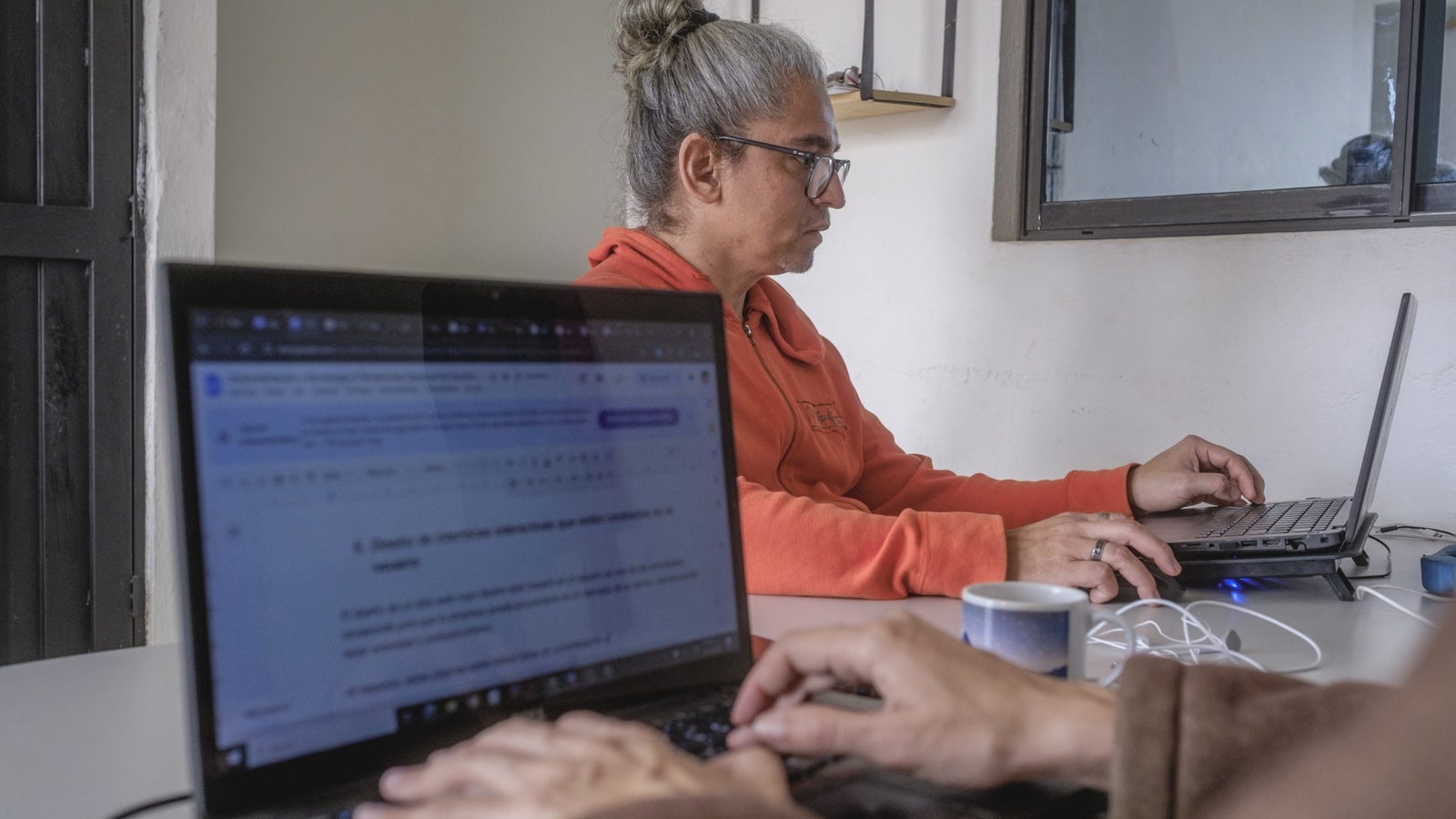
Trump Is Spending Billions on Border Security. Some Residents Living There Lack Basic Resources.
April 16, 2025
‘Trump Just Caved to Big Pharma—Again’: New Order Aims to Delay Drug Price Negotiations | Common Dreams
April 16, 2025It doesn’t matter if Oskarina Fuentes is at a medical appointment an hour from her home in the mountain town of Caldas in Colombia. Nor does it matter if it’s 2 o’ clock in the morning.
When her phone vibrates with a WhatsApp alert from her “Task Hunters” group, she has little time to react.
Fuentes, 35, rushes to her computer and logs on to Appen, an artificial-intelligence data platform where she has been tagging data for the past decade. She works quickly as she competes with thousands of other crowd-workers for 5–25 cents per task. With each click, she may choose the genre of a movie, decide if an image is AI-generated, or solve a math problem.
Fuentes is among the hundreds of thousands of Venezuelans who do informal work for the tech industry. As Venezuela’s economic crisis worsened and its currency became nearly worthless around 2018, educated Venezuelans signed up on AI-training and freelancing platforms to earn in U.S. dollars. They formed up to 75% of the workforce at companies like Mighty AI and Scale AI in 2018. Remotasks even created a special program to attract Venezuelan workers.
They annotated all kinds of data to train AI tools, such as vision models, autonomous vehicles, and warehousing robots. They also moderated violent content and wrote articles to optimize websites for search.
But with the rise of generative AI, such digital jobs have become scarce and poorly paid, workers and researchers told Rest of World. Without formal contracts, the workers have little choice but to find ways to compete with AI, or quit.
“Every year, there have been fewer tasks,” said Fuentes, who moved to Colombia in 2019 from Cabimas, Venezuela. “If a task doesn’t come up, I’m just waiting, living with uncertainty. Days, weeks, even months can go by without anything coming up at all.”
About 44% of search engine optimization is now done using AI, according to industry estimates. There are fewer AI-data jobs, too, as models can now generate their own synthetic training data, Óscar Maldonado, who studies the platform economy for Fairwork at the Oxford Internet Institute, told Rest of World.
Once an AI model is fully trained, it is usually smart enough to work with little human intervention, he said. The low-level workers become expendable.
“There is no formal relationship between the platforms and the workers. If the tasks disappear, they are simply no longer called,” he said.
Clients now require more complex and diverse data sets, as well as comprehensive model evaluations.
Fuentes trained as an oil and gas engineer in Venezuela, but found it more profitable to do tasks for the Australian company Appen, one of the largest providers of training data for AI and machine learning models. Before 2022, she made around $500 a month, enough to live comfortably in Colombia. Tasks would always be waiting when she turned on her computer, she recalled.
Her earnings have since reduced, and she now makes 1,410,000 Colombian pesos ($320) — around the minimum wage. The tasks also don’t come in regularly, and she has been borrowing money to keep afloat.
Fuentes and 19 other Venezuelan taskers have a WhatsApp group where they take turns to alert members when a task becomes available. “If someone has insomnia, they say, ‘Don’t worry, I’ll keep an eye out tonight,’” she said.
Generative AI has lowered demand for training data in the past year, Si Chen, vice president of strategy at Appen, told Rest of World.
The company, known for providing human-annotated data using more than 1 million workers, saw its market value fall by 99% in the three years ending 2023. Its revenue dropped by 14% last year, and it is now investing in generative AI projects.
“These trends are not exclusive to our platform; they reflect a broader, global shift in the industry, including in Latin America,” Chen said.
“Clients now require more complex and diverse data sets, as well as comprehensive model evaluations,” said Chen. They require specialized data training on coding, science and logic, as well as focused, large-scale tests of models, he said.
But infrastructure barriers stop educated Venezuelan workers from accessing these more complex tasks, according to Maldonado from Fairwork. That’s especially the case for residents of Venezuela, who experience low internet speeds and frequent power cuts, he said.
As for Venezuelans who’ve moved to other nations, they often use aging computers that cannot handle difficult tasks. Some 7.5 million highly skilled young workers have left Venezuela in recent years, with one in three living in Colombia. Many lack the documents necessary to access formal employment in their adopted nations, leaving digital jobs as one of the few ways to earn a living.

“Annotation work has been very attractive to migrants precisely because it was perceived to have very few access barriers,” Maldonado said.
Freelance content writing work has also changed with the rise of generative AI — workers who can afford it now use tools such as ChatGPT to create content more quickly.
Maryfel Alvarado, a Venezuelan literature graduate in Medellín, Colombia, has been writing SEO content for seven years. Since 2024, she has seen rates plummet on freelancing platforms Fiverr and Upwork, she told Rest of World. She used to get between $20 and $50 per 1,000 words. These days, she is usually offered $7, she said.
“Some of us have managed to maintain our monthly income, but we’ve had to change our work methodologies,” Alvarado said.
Alvarado and her partner have purchased a premium subscription to ChatGPT, at $20 per month, which they use to accelerate text production for some clients. For others who pay decently, she doesn’t use AI.
“Now I can produce five articles in one day; before, it was only three,” Alvarado said.

A spokesperson for Upwork told Rest of World that AI is “empowering” new forms of work and helping professionals work more efficiently. It declined to comment on freelancer rates in Latin America. Fiverr did not respond to a request for comment.
Clients now expect writers to use ChatGPT, which is restricted in Venezuela, Martín Lossada, a petrochemical engineer and SEO writer based in Maracaibo, told Rest of World. Without the tool, Lossada used to spend weeks glued to the computer to keep up with the volume, he recalled. Clients paid him in bulk, at $5 per job for 100 jobs, he said.
Lossada finally left SEO writing in April 2024, and has resumed working as an operator in an oil field. He earns about $200 more and works fewer hours.
“I’m happy. I [can] get away from the computer after writing every single day for five years,” he said.
Venezuelan data workers know these jobs may entirely disappear one day — a possibility that makes Fuentes anxious.
“There could come a time when there are simply no more tasks, it’s over and forgotten,” she said. “I think that would be a nightmare for all of us.”
#Venezuelan #migrants #relied #clickwork #survive #replacing
Thanks to the Team @ Rest of World – Source link & Great Job Laura Rodríguez Salamanca







